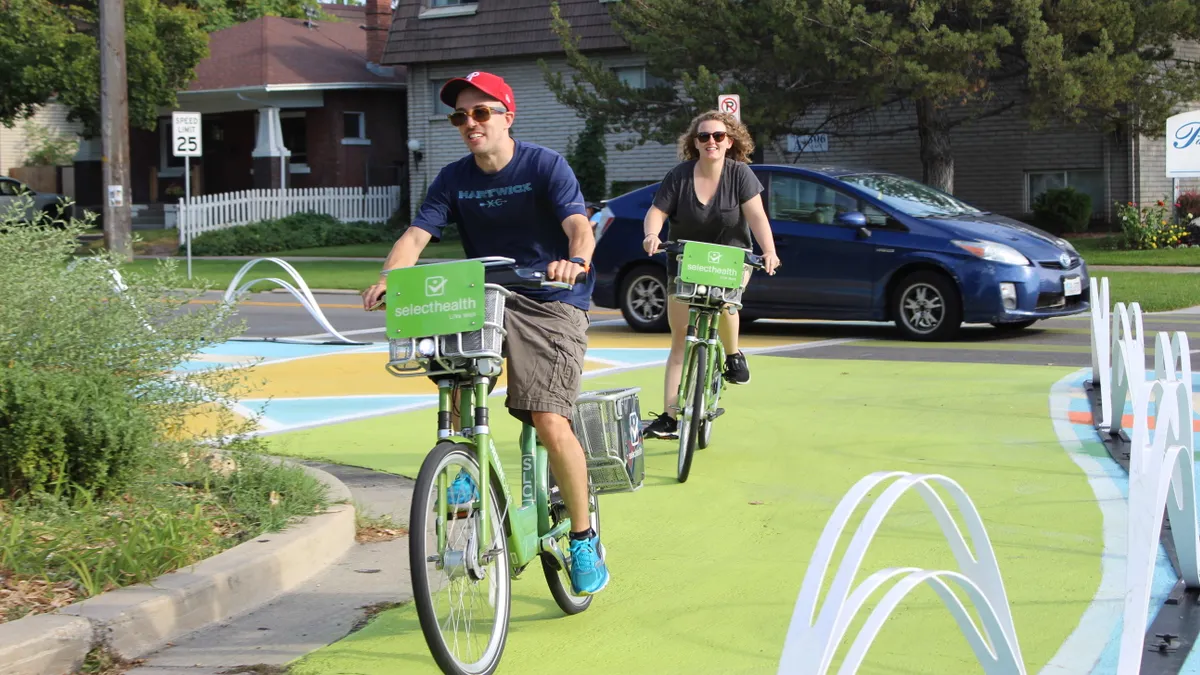UPDATED: July 28, 2020: Spin announced Tuesday the winners of its inaugural “Build a Better Barrier Challenge,” designed to enhance street use and safety for all active transportation riders.
The grand prize went to a design entitled "WeCLAIM," created by Wisconsin Bike Federation advocate Caressa Givens and Milwaukee-based designer Arthur Talayko, that uses reclaimed tires to build lane dividers filled with plants and grasses. The team will receive a $1,000 cash prize, and Spin will work with Ford Motor Company’s D-Ford design group to manufacture a WeCLAIM prototype and produce it at scale.
Other winners included Aaron Greiner in second place for his designs "The Chain" and "WAVE," and Bruce Ferguson in third place for his "Velo View" design, all of which use sustainable materials. They won $500 and $250, respectively.
Dive Brief:
- Micromobility company Spin and urban planning consultants Team Better Block kicked off the "Build a Better Barrier Challenge" on Tuesday, calling for participants to design lane barriers that protect and separate bicyclists, pedestrians and other non-drivers from vehicles.
- Inspiration for the challenge was sparked by the new coronavirus (COVID-19) pandemic, which has presented cities with opportunities to re-think the use of public spaces for adequate social distancing. Spin said when shelter-in-place orders are lifted and the pandemic’s curve flattens, it is "abundantly clear" that social distancing will still be important and may encourage greater use of bikes and scooters.
- Eleven judges will assess the designs on various factors including protection, maintenance costs, durability, affordability to all communities, sustainability of materials and aesthetics. An overall winner will receive $500 cash and will have their concept piloted in projects across the U.S.
Dive Insight:
The growth in bicycling and walking during the coronavirus pandemic, coupled with a dramatic reduction in vehicle traffic, has some thinking about how city streets can be designed differently to encourage less single-occupancy vehicle usage, especially post-pandemic. It shares many similarities with the view that the improved climate amid a closed economy and reduced emissions is something that could be replicated once the worst is over.
The repurposing of street space has already been seen in a number of U.S. cities. Philadelphia was one of the first to do so when it closed MLK Drive, a major thoroughfare, to vehicular traffic. Others including Minneapolis, Washington, DC and Oakland, CA have followed suit, and advocates in the biking space said such moves need not be a heavy lift.
"The streets are the largest consumption of public space in any city in the U.S.," Kyle Wagenschutz, director of local innovation at advocacy group PeopleForBikes, told Smart Cities Dive in an interview. "The public roadway is the No. 1 space owned by the city and controlled by the city ... [They] don't have to go through a lot of hurdles to change the way streets work, and they know that people are going to be coming outside."
For Spin, this represents a further foray into street infrastructure investments since it was acquired by Ford Motor Company in late 2018. Last year, the company partnered with Swiftmile to pilot solar-powered scooter docking stations in Washington and Ann Arbor, MI, and earlier this year deployed its Spin Hub charging stations in the public right-of-way in Phoenix.
While dockless companies face an uncertain future due to the financial impacts of the coronavirus, Spin sees a future where people drive less and use alternative transportation modes. In a statement, Kay Cheng, director of infrastructure initiatives at Spin, said those alternatives "will be critical to continuing physical distancing."
To keep up with all of our coverage on how the new coronavirus is impacting U.S. cities, visit our daily tracker.












